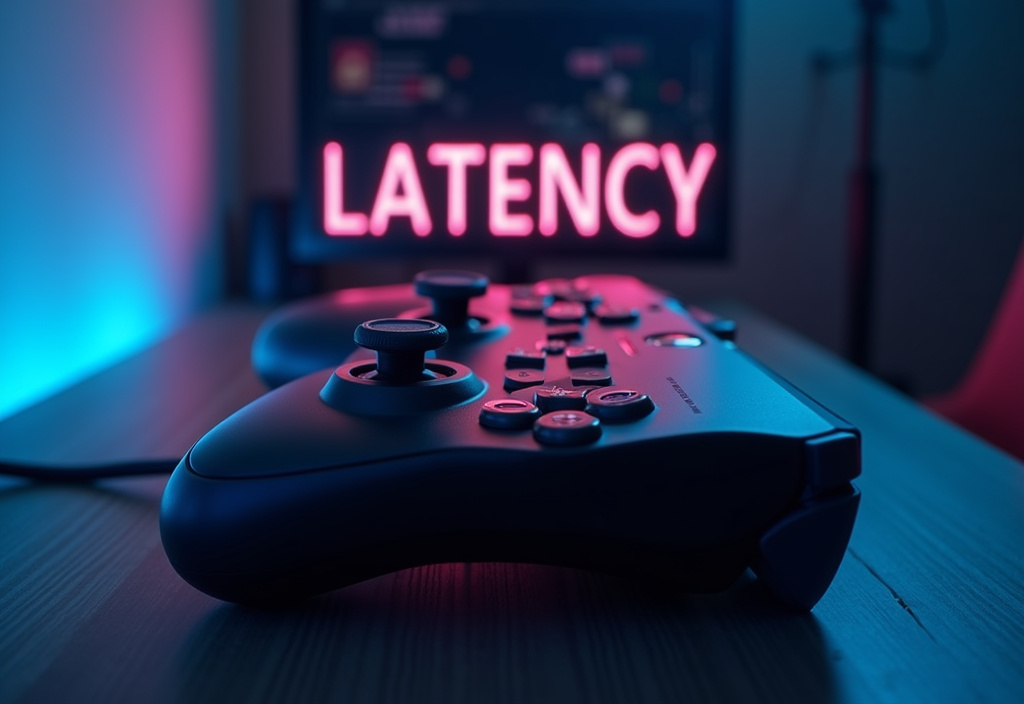VPNs for Home Gaming Networks: Ensuring Lag-Free Play

Table of Contents
gaming experience
In the dynamic realm of online gaming, where milliseconds can determine victory or defeat, a consistently smooth and secure connection is not just a luxury, but a necessity. Fluctuations in internet speed, regional content restrictions, and the ever-present threat of cyberattacks can severely compromise the . This is where the strategic implementation of a steps into the spotlight, offering a multifaceted solution to these common challenges.
A carefully chosen and properly configured VPN, specifically tailored for gaming, possesses the potential to significantly minimize lag, effectively bypass frustrating geographic limitations, and fortify , ultimately cultivating a more immersive, enjoyable, and competitive online environment. The concept underpinning a Virtual Private Network (VPN) isn't new. Initially conceived as a secure method for remote access and robust data encryption across unprotected networks, its adaptation to the unique demands of online gaming is a more recent phenomenon.
This surge in adoption is intrinsically linked to the increasing technical sophistication of modern online games and a growing understanding among gamers regarding the multitude of advantages a dedicated gaming VPN can unlock. At its core, a VPN functions by establishing an encrypted, secure tunnel between a gamer's device – whether it be a high-powered gaming PC or a dedicated console – and a remote server strategically located within a global network. All internet traffic generated by the gaming device is then meticulously routed through this fortified tunnel, effectively masking the user's true IP address and employing advanced encryption techniques to safeguard the data as it traverses the internet.
For the discerning gamer, this technical maneuver translates into a cascade of tangible benefits that directly impact their online gameplay. Foremost among these is the notable potential for , a primary concern for anyone engaged in competitive online matches. By intelligently connecting to a VPN server that is physically closer to the game's central server infrastructure, gamers can effectively bypass congested and inefficient network routes.
This optimized routing minimizes latency, the bane of any online gamer, resulting in smoother, more responsive gameplay where every reaction counts. Furthermore, a VPN offers the valuable capability to circumvent geographic restrictions meticulously implemented by game publishers and developers. These restrictions often limit access to specific game content or entire game servers based on a player's geographic location.
By masking their true IP address and assuming an IP address from a permitted region, gamers can effortlessly bypass these frustrating barriers, unlocking a wider range of gaming opportunities and experiences. Perhaps most crucially in today's interconnected world, a VPN provides significantly enhanced , a growing concern in the face of rising cybersecurity threats. By diligently encrypting all internet traffic emanating from the gaming device, the VPN erects a formidable barrier against malicious actors seeking to intercept sensitive data.
This includes critical information such as login credentials (usernames and passwords), financial details employed for in-game purchases, and other personally identifiable information. This fortified security posture is absolutely vital for shielding gamers from a spectrum of potential cyberattacks, including identity theft, financial fraud, and other online threats that could compromise both their gaming experience and their personal security. Selecting the optimal VPN solution for gaming requires a discerning and informed approach.
Not all VPNs are created equal, and a significant disparity exists in their capabilities and suitability for the demanding demands of online gaming. Critical factors that must be carefully considered include the breadth and distribution of the VPN provider's server network, the consistently achievable connection speeds, the strength and type of security protocols employed, and the overall ease of use and configuration. A VPN with an expansive network of servers strategically located across the globe offers unparalleled flexibility in bypassing geographical restrictions and optimizing connection routes for various game servers.
Consistently high-speed connections are absolutely paramount to minimizing latency and ensuring a consistently smooth and responsive gaming experience, free from frustrating lag spikes. Robust and modern security protocols, such as OpenVPN or the increasingly popular WireGuard, are essential for providing unwavering encryption and comprehensively protecting player data from potential threats. Finally, a user-friendly interface and intuitive configuration options greatly simplify the VPN setup and management process, ensuring that gamers can seamlessly integrate the VPN into their existing gaming setup without requiring extensive technical expertise.
The ideal should integrate harmoniously into their existing gaming ecosystem, furnishing a dependable and secure connection without imposing a significant performance penalty or requiring constant troubleshooting.
lag reduction
Understanding the underlying technical mechanisms by which a VPN contributes to tangible is paramount to fully appreciating its transformative potential within the demanding context of online gaming. Latency, commonly and colloquially referred to as "ping," represents the round-trip time, measured in milliseconds (ms), that it takes for data packets to travel from a gamer's device to the game server and, crucially, back again. Elevated latency can manifest as noticeable and frustrating delays, severely impacting responsiveness and making it exceedingly difficult for players to react quickly and accurately to in-game events, ultimately degrading the overall .
A multitude of factors can contribute to elevated latency, including the physical distance between the gamer's location and the game server's location, periods of intense network congestion along the data's path, and inherent inefficiencies in the routing protocols employed by internet service providers (ISPs). A well-configured VPN offers a powerful means of mitigating these detrimental factors by establishing a more streamlined and optimized connection pathway to the game server. When a gamer connects to a VPN server, the VPN software intelligently assesses the current network conditions and strategically selects the optimal route based on factors such as real-time network congestion and geographical proximity to the game server.
This intelligent route selection effectively bypasses highly congested network segments, which are often the primary drivers of lag, and reduces the overall distance that data packets need to traverse, inherently minimizing latency and resulting in measurably improved responsiveness. Furthermore, certain VPN providers cater specifically to the needs of gamers by offering a selection of specialized gaming servers, meticulously engineered and optimized specifically for ultra-low latency. These specialized servers are strategically located in close physical proximity to major game server hubs and employ advanced routing algorithms and optimized hardware configurations to minimize lag and provide the most responsive gaming experience possible.
By connecting to one of these dedicated gaming servers, gamers can often experience a dramatic and noticeable reduction in their ping times, leading to a substantially enhanced overall gaming performance where every millisecond matters. However, it is crucial to acknowledge that a VPN, if not configured correctly or if used injudiciously, can paradoxically increase latency and worsen the . Connecting to a VPN server that is located a significant distance away from the game server, or to a server that is currently experiencing abnormally high traffic loads, can introduce additional overhead and delays, negating any potential benefits and leading to increased lag.
Therefore, it is absolutely essential to select a VPN provider that boasts a robust and geographically diverse network of servers and to painstakingly select the server location that is closest to the specific game server being accessed. In addition to its ability to optimize connection pathways and minimize distance-related latency, a VPN can also play a crucial role in mitigating the negative effects of bandwidth throttling, a common practice employed by some internet service providers (ISPs). Bandwidth throttling refers to the intentional and often surreptitious slowing down of internet speeds for specific types of network traffic, typically during periods of peak network usage to alleviate congestion.
Unfortunately, gaming traffic is often a target of bandwidth throttling, resulting in increased latency, unpredictable lag spikes, and a generally frustrating and unstable gaming experience. A VPN effectively circumvents bandwidth throttling tactics by encrypting all internet traffic originating from the gamer's device. By encrypting the data stream, the VPN renders it exceedingly difficult, if not impossible, for the ISP to identify and selectively throttle specific types of data, including gaming traffic.
This ensures a more consistent and reliable connection speed, even during periods of peak network congestion, allowing gamers to enjoy a more stable and predictable . Another compelling advantage of utilizing a for stems from its capability to bypass irksome geographic restrictions strategically implemented by certain game servers and publishers. Some online games are deliberately region-locked, meaning that they can only be accessed and played from specific geographic locations that are authorized by the game publisher.
A VPN empowers gamers to effortlessly bypass these artificial restrictions by connecting to a VPN server located within a supported region, thereby unlocking access to previously inaccessible game servers, expanding their pool of potential online opponents, and enriching their overall gaming horizons. The ability to circumvent geographic restrictions extends beyond mere server access; it also encompasses access to game updates and downloadable content (DLC). Some game publishers release updates and downloadable content at disparate times across different regions.
By utilizing a VPN, gamers can simulate their location to a region where the desired update or DLC is already available, gaining immediate access to the latest content and features without having to endure frustrating delays based on their actual geographic location.
lag reduction
Beyond the tangible benefits of optimized connection speed and significant , a provides an indispensable and often overlooked layer of robust . The contemporary online gaming landscape is increasingly targeted by sophisticated cybercriminals who actively seek to exploit vulnerabilities in game systems and user accounts, aiming to steal sensitive personal and financial information for malicious purposes. Gamers are particularly vulnerable to these attacks due to the considerable amount of personal data they routinely share online, including their login credentials (usernames and passwords), financial details used for in-game purchases, and their valuable in-game currency and virtual assets.
A VPN provides a crucial shield against these threats by meticulously encrypting all internet traffic originating from the gamer's device. Encryption transforms readable data into an indecipherable format, rendering it virtually impossible for hackers to intercept and understand sensitive information as it travels across the internet. This encrypted tunnel effectively protects gamers from a wide array of cyber threats, ensuring the privacy and security of their personal data.
One of the most common and devastating cyberattacks targeting gamers is credential stuffing. This technique involves hackers obtaining lists of compromised usernames and passwords from previous data breaches and then systematically attempting to use these credentials to log into various online gaming accounts. If a gamer reuses the same username and password across multiple platforms (a common practice, unfortunately), they become particularly vulnerable to credential stuffing attacks.
A VPN can help mitigate the risk of credential stuffing by masking the gamer's true IP address. When a hacker attempts to log into an account using stolen credentials, they typically do so from a specific IP address. If the gaming platform detects multiple login attempts from the same IP address with different usernames, it may flag the activity as suspicious and take steps to block the attacker.
By using a VPN, the hacker's IP address is masked, making it more difficult for the gaming platform to detect the attack and potentially preventing the attacker from gaining access to the account. Another significant threat to gamers is Distributed Denial of Service (DDoS) attacks. A DDoS attack involves overwhelming a target server with a flood of malicious traffic, rendering it unavailable to legitimate users.
DDoS attacks are often used by disgruntled gamers or rival clans to disrupt gameplay and gain an unfair advantage. A VPN can help protect against DDoS attacks by masking the gamer's true IP address. When a DDoS attack is launched, the attacker typically targets the victim's IP address.
By using a VPN, the attacker is unable to determine the gamer's true IP address, making it much more difficult to launch a successful DDoS attack. Even if the VPN server itself is targeted by a DDoS attack, the impact on individual gamers is minimized because the attack is distributed across the VPN's infrastructure rather than directly targeting the gamer's connection. A VPN also provides crucial protection against man-in-the-middle (MITM) attacks.
A MITM attack involves an attacker intercepting communication between two parties, such as a gamer and a game server. The attacker can then eavesdrop on the communication, steal sensitive information, or even manipulate the data being transmitted. VPNs prevent MITM attacks through the use of encryption and authentication.
Encryption ensures that the data being transmitted between the gamer and the game server cannot be read by an attacker, even if they intercept the communication. Authentication verifies the identity of the server, ensuring that the gamer is communicating with the legitimate game server and not a fraudulent imposter. By encrypting all internet traffic and verifying the identity of the server, a VPN provides comprehensive protection against MITM attacks, safeguarding sensitive information from being intercepted and manipulated.
Beyond these specific threats, a VPN also provides a general layer of privacy and anonymity online. In today's increasingly data-driven world, ISPs and other online entities are constantly collecting information about users' browsing habits and online activities. A VPN prevents this tracking by masking the user's IP address and encrypting their internet traffic, making it more difficult for these entities to monitor their online behavior.
This increased privacy and anonymity can be particularly beneficial for gamers who are concerned about their personal information being collected and used for marketing or other purposes. By providing robust and enhancing online privacy, a offers invaluable peace of mind, allowing gamers to focus on enjoying their favorite games without the constant worry of cyber threats and privacy intrusions. The is thus elevated not only through performance enhancements but also through a heightened sense of security and control over one's digital footprint.
VPN for gamers
Choosing the right is a crucial decision that can significantly impact both the and the level of afforded. With a plethora of VPN providers vying for attention in the market, it is essential to carefully evaluate various factors and features to ensure that the chosen VPN meets the specific needs and requirements of a home gaming network. One of the most important considerations is the VPN provider's server network.
A VPN with a large and geographically diverse network of servers offers several key advantages. Firstly, it provides greater flexibility in bypassing geographic restrictions. Gamers can connect to servers in different regions to access content or servers that may be restricted in their own location.
Secondly, it allows gamers to optimize their connection routes for . By connecting to a server that is closer to the game server, gamers can often reduce latency and improve responsiveness. Finally, a large server network reduces the risk of server overload and congestion, ensuring a more stable and reliable connection.
When evaluating a VPN's server network, pay close attention to the number of servers offered, the geographic distribution of those servers, and the server load. Choose a VPN with servers located in regions that are relevant to the games you play and that have a low server load to ensure optimal performance. Connection speed is another critical factor to consider.
A VPN can introduce some overhead to your internet connection due to the encryption process. However, a high-quality VPN should minimize this overhead and provide fast and stable connection speeds that are suitable for online gaming. Look for a VPN provider that uses optimized servers and supports fast and modern VPN protocols, such as WireGuard.
WireGuard is a relatively new VPN protocol that is known for its speed, security, and ease of use. It is significantly faster than older protocols like OpenVPN and offers excellent performance for gaming. Before committing to a VPN, be sure to test its connection speed to ensure that it meets your requirements.
Most VPN providers offer free trials or money-back guarantees, allowing you to test the service risk-free. Security is paramount when choosing a VPN, particularly for gamers who share sensitive information online. Look for a VPN provider that uses strong encryption protocols, such as AES-256, to protect your data from interception.
Also, ensure that the VPN provider has a strict no-logs policy, meaning that they do not collect or store any information about your online activities. A no-logs policy is essential for protecting your privacy and anonymity online. Another important security feature to look for is a kill switch.
A kill switch automatically disconnects your internet connection if the VPN connection drops, preventing your data from being exposed. A kill switch is particularly important for gamers who want to ensure that their IP address and online activities are always protected. User-friendliness is also an important consideration, especially for gamers who are not technically savvy.
Choose a VPN with a user-friendly interface and easy-to-configure settings. The VPN should be easy to install, connect to, and disconnect from. It should also provide clear instructions and helpful support documentation.
Many VPN providers offer dedicated gaming apps that are specifically designed for optimizing gaming performance. These apps often include features such as automatic server selection, ping testing, and lag reduction tools. Finally, consider the price of the VPN.
VPN prices can vary widely, so it is important to compare different providers and choose one that offers the best value for your money. Keep in mind that the cheapest VPN is not always the best option. It is often worth paying a little more for a high-quality VPN that offers better performance, security, and customer support.
In summary, when choosing a , consider the server network, connection speed, security, user-friendliness, and price. By carefully evaluating these factors, you can select a VPN that provides a secure, reliable, and lag-free while ensuring comprehensive .
home gaming VPN
Effectively utilizing a to optimize the and maximize requires a strategic approach to configuration and usage. Simply installing a VPN and connecting to a random server is unlikely to yield the desired results. Instead, gamers should adopt a proactive and informed approach to ensure that they are reaping the full benefits of their VPN subscription.
The first step in optimizing a VPN for gaming is to carefully select the most appropriate server location. As previously mentioned, connecting to a server that is geographically closer to the game server can significantly reduce latency and improve responsiveness. However, it is not always possible to determine the exact location of the game server.
In these cases, it is generally best to connect to a server that is located in the same region as the game server or that is geographically close to the game's primary player base. Many VPN providers offer ping testing tools that allow you to measure the latency to different servers. Use these tools to identify the servers that offer the lowest ping times to the games you play.
Experiment with different server locations to find the one that consistently provides the best performance. In addition to server location, it is also important to consider the server load. A server that is heavily loaded will experience higher latency and slower connection speeds.
Choose a server that has a low server load to ensure optimal performance. Most VPN providers display the server load alongside the server location. Selecting the right VPN protocol can also have a significant impact on gaming performance.
As previously mentioned, WireGuard is generally the best option for gaming due to its speed and efficiency. However, WireGuard may not be supported by all VPN providers or on all devices. If WireGuard is not available, OpenVPN is a good alternative.
When using OpenVPN, choose the UDP protocol over the TCP protocol. UDP is generally faster than TCP and is better suited for real-time applications like gaming. Optimizing your device's network settings can also improve VPN performance.
Ensure that your operating system and network drivers are up to date. Close any unnecessary applications that may be consuming bandwidth in the background. Consider using a wired connection instead of a wireless connection for a more stable and reliable connection.
If you are using a wireless connection, ensure that you are using the 5 GHz band instead of the 2.4 GHz band. The 5 GHz band offers faster speeds and less interference. To further enhance , consider enabling additional security features offered by your VPN provider.
These features may include a kill switch, DNS leak protection, and IPv6 leak protection. A kill switch automatically disconnects your internet connection if the VPN connection drops, preventing your data from being exposed. DNS leak protection prevents your DNS requests from being sent to your ISP, which can expose your browsing history.
IPv6 leak protection prevents your IPv6 address from being leaked, which can compromise your privacy. Regularly monitor your VPN connection to ensure that it is working properly. Check the VPN's logs to see if there are any errors or warnings.
If you experience any problems, contact your VPN provider's customer support for assistance. Finally, remember to update your VPN software regularly. VPN providers often release updates that include performance improvements, security enhancements, and bug fixes.
By keeping your VPN software up to date, you can ensure that you are always benefiting from the latest features and security protections. By following these tips, gamers can effectively utilize a to optimize their , minimize lag, and maximize . The proactive and informed use of a VPN can transform the online gaming experience, providing a secure, reliable, and enjoyable environment for competitive and casual gamers alike.
The optimal configuration will vary depending on the specific game, network conditions, and VPN provider, but a commitment to experimentation and continuous optimization will yield the best possible results.
Stay Updated
Get the latest VPN news, tips, and exclusive deals to your inbox.




